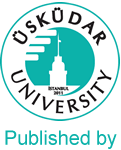Article
Makale
Investigating ‘WhatsApp’ for Collaborative Learning among Undergraduates
Lisans Öğrencileri ve İşbirlikli Öğrenme: ‘WhatApp’ Örneği
Silas UDENZE,Barth OSHIONEBO
Year 3, Issue 5, Pages:24-50
Yeni medya teknolojilerinin benimsenmesi eğitimde hızla bir eğilim haline gelmektedir. Sosyal medyanın artan popülaritesi göz önüne alındığında, gelecekteki eğitim projelerinin geliştirilmesinde sosyal medya ağlarını anlamak ve benimsemek geçerli hale gelmiştir. Bu çalışma, WhatsApp platformunun Nijerya, Gwagwalada’daki Abuja Üniversitesi'ndeki lisans öğrencileri arasında işbirlikli öğrenmeyi nasıl sağlayabileceğini araştırmaktadır. Bu amaçla, çalışmayı yürütmek için ikili bir araştırma metodolojisine başvurulmuş, anket ve odak grup görüşme yöntemi (FGD) kullanılmıştır. Toplamda 400 lisans öğrencisine anket uygulanmış, anketten elde edilen veriler basit yüzde tablosu ve Microsoft Office araçları kullanılarak analiz edilmiş ve odak grup görüşmesinden çıkan veriler tematik olarak analiz edilmiştir. Çalışma bu amaçla ‘Teknoloji Kabul Model’ini (TKM) içermektedir. Araştırmadan elde edilen sonuçlar, “algılanan fayda” ve “algılanan kullanım kolaylığı”nın öğrenciler arasında WhatsApp kullanımına yol açtığını ortaya koymuştur. Ayrıca, öğrencilerin sınıf WhatsApp grubunu çeşitli amaçlar için, özellikle öğrenme için kullandıkları saptanmıştır. Çalışmada sınıf WhatsApp gruplarının işbirlikli öğrenmeye büyük ölçüde katkı sağladığı sonucuna ulaşılmıştır. Bununla birlikte, sınıf WhatsApp gruplarındaki en büyük zorluğun, platformlarda alakasız içeriklerin paylaşılması olduğu saptanmıştır. Çalışmada yüksek kurumlarda öğrenmeyi artırmak için WhatsApp'ın potansiyellerinden tam olarak yararlanmanın elzem olduğu sonucuna varılmıştır.
The adoption of new media technologies is rapidly becoming a trend in educational environment. Given the growing popularity of social media, it has become pertinent to understand and adopt social media networks in developing future educational blue prints. This study investigates the extent to which WhatsApp platform could engender collaborative learning among undergraduate students in the University of Abuja, Gwagwalada, Nigeria. To achieve this aim, a dual research methodology was employed to drive the study. Both survey and Focus Group Discussion (FGD) were employed respectively. Surveying 400 undergraduates, data from the survey were analysed using Simple Percentage Table (SPT) and Microsoft Office tools, while data that emanated from the focus group were analysed thematically. The study incorporated ‘Technology Acceptance Model’ (TAM) to direct and guide it. Discoveries from the study found that “perceived usefulness” and “perceived ease of use” engender the use of WhatsApp among students. Also, it was discovered that students incorporated and domesticated class WhatsApp group for various purposes, particularly for learning. Overall, the study found that class WhatsApp group engenders collaborative learning to a large extent. However, it was discovered that the major challenge in class WhatsApp groups is the posting of irrelevant contents on the platforms. The study concluded that it is paramount to fully harness the potentials of WhatsApp in order to enhance learning in higher institutions.

